初二英语 条件状语从句
- 格式:doc
- 大小:27.50 KB
- 文档页数:3
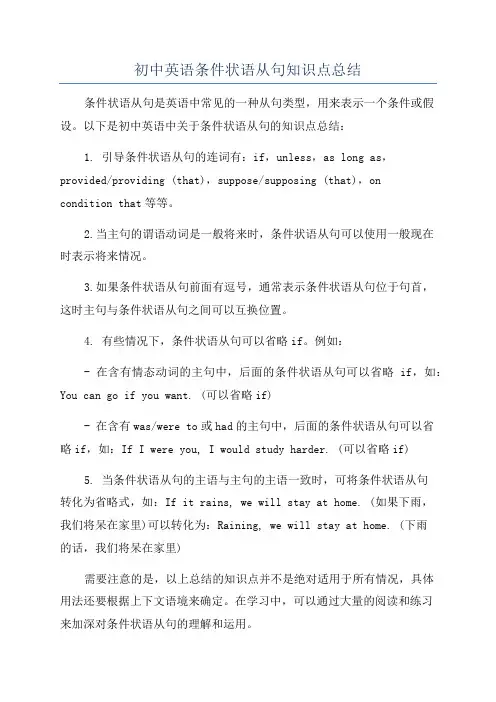
初中英语条件状语从句知识点总结
条件状语从句是英语中常见的一种从句类型,用来表示一个条件或假设。
以下是初中英语中关于条件状语从句的知识点总结:
1. 引导条件状语从句的连词有:if,unless,as long as,
provided/providing (that),suppose/supposing (that),on
condition that等等。
2.当主句的谓语动词是一般将来时,条件状语从句可以使用一般现在
时表示将来情况。
3.如果条件状语从句前面有逗号,通常表示条件状语从句位于句首,
这时主句与条件状语从句之间可以互换位置。
4. 有些情况下,条件状语从句可以省略if。
例如:
- 在含有情态动词的主句中,后面的条件状语从句可以省略if,如:You can go if you want. (可以省略if)
- 在含有was/were to或had的主句中,后面的条件状语从句可以省
略if,如:If I were you, I would study harder. (可以省略if)
5. 当条件状语从句的主语与主句的主语一致时,可将条件状语从句
转化为省略式,如:If it rains, we will stay at home. (如果下雨,
我们将呆在家里)可以转化为:Raining, we will stay at home. (下雨
的话,我们将呆在家里)
需要注意的是,以上总结的知识点并不是绝对适用于所有情况,具体
用法还要根据上下文语境来确定。
在学习中,可以通过大量的阅读和练习
来加深对条件状语从句的理解和运用。
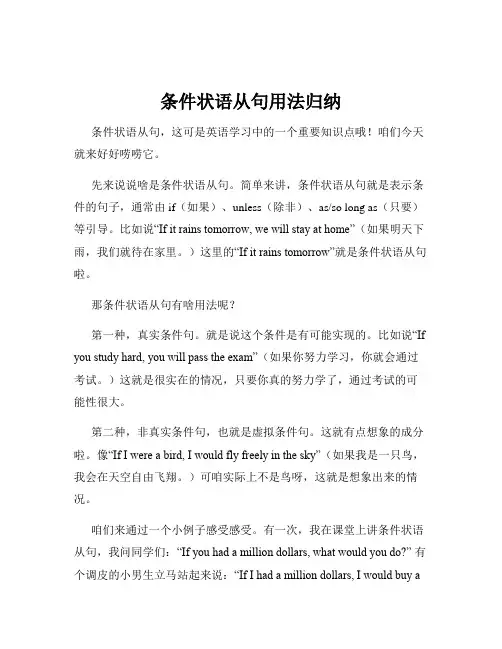
条件状语从句用法归纳条件状语从句,这可是英语学习中的一个重要知识点哦!咱们今天就来好好唠唠它。
先来说说啥是条件状语从句。
简单来讲,条件状语从句就是表示条件的句子,通常由 if(如果)、unless(除非)、as/so long as(只要)等引导。
比如说“If it rains tomorrow, we will stay at home”(如果明天下雨,我们就待在家里。
)这里的“If it rains tomorrow”就是条件状语从句啦。
那条件状语从句有啥用法呢?第一种,真实条件句。
就是说这个条件是有可能实现的。
比如说“If you study hard, you will pass the exam”(如果你努力学习,你就会通过考试。
)这就是很实在的情况,只要你真的努力学了,通过考试的可能性很大。
第二种,非真实条件句,也就是虚拟条件句。
这就有点想象的成分啦。
像“If I were a bird, I would fly freely in the sky”(如果我是一只鸟,我会在天空自由飞翔。
)可咱实际上不是鸟呀,这就是想象出来的情况。
咱们来通过一个小例子感受感受。
有一次,我在课堂上讲条件状语从句,我问同学们:“If you had a million dollars, what would you do?” 有个调皮的小男生立马站起来说:“If I had a million dollars, I would buy abig house and a super cool car for my teacher!” 全班哄堂大笑,我也忍不住笑了。
这孩子,还挺会哄老师开心呢!接下来说说条件状语从句的时态问题。
在真实条件句中,如果主句是一般将来时,从句要用一般现在时。
就像“If you come here tomorrow, I will be very happy” 而在虚拟条件句中,时态就有很多变化啦,这可得好好记住。
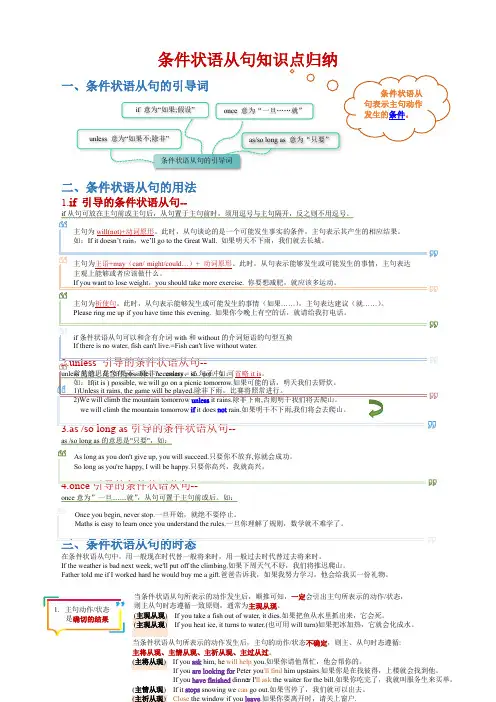
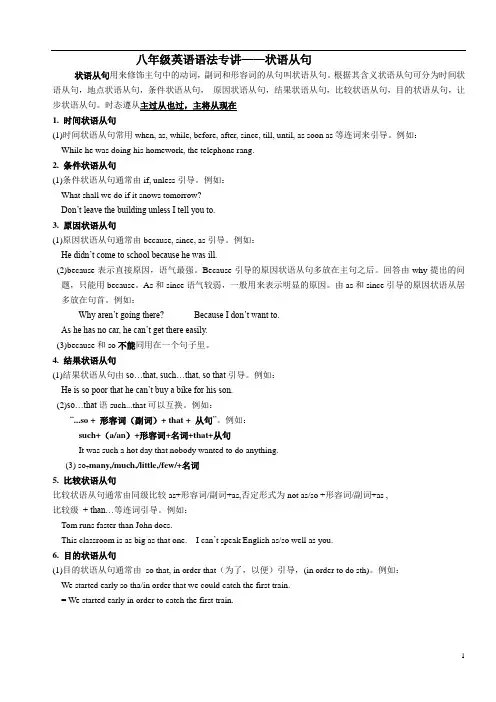
八年级英语语法专讲——状语从句状语从句用来修饰主句中的动词,副词和形容词的从句叫状语从句。
根据其含义状语从句可分为时间状语从句,地点状语从句,条件状语从句,原因状语从句,结果状语从句,比较状语从句,目的状语从句,让步状语从句。
时态遵从主过从也过,主将从现在1. 时间状语从句(1)时间状语从句常用when, as, while, before, after, since, till, until, as soon as等连词来引导。
例如:While he was doing his homework, the telephone rang.2. 条件状语从句(1)条件状语从句通常由if, unless引导。
例如:What shall we do if it snows tomorrow?Don’t leave the building unless I tell you to.3. 原因状语从句(1)原因状语从句通常由because, since, as引导。
例如:He didn’t come to school because he was ill.(2)because表示直接原因,语气最强。
Because引导的原因状语从句多放在主句之后。
回答由why提出的问题,只能用because。
As和since语气较弱,一般用来表示明显的原因。
由as和since引导的原因状语从居多放在句首。
例如:------Why aren’t going there?------Because I don’t want to.As he has no car, he can’t get there easily.(3)because和so不能同用在一个句子里。
4. 结果状语从句(1)结果状语从句由so…that, such…that, so that引导。
例如:He is so poor that he can’t buy a bike for his son.(2)so…that语such...that可以互换。
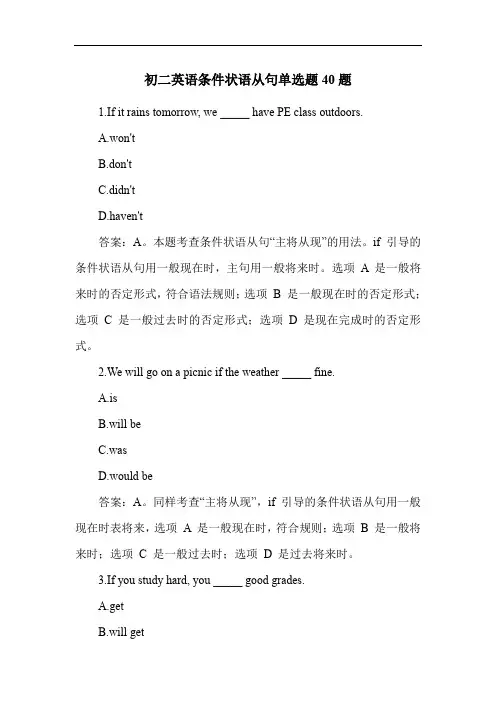
初二英语条件状语从句单选题40题1.If it rains tomorrow, we _____ have PE class outdoors.A.won'tB.don'tC.didn'tD.haven't答案:A。
本题考查条件状语从句“主将从现”的用法。
if 引导的条件状语从句用一般现在时,主句用一般将来时。
选项A 是一般将来时的否定形式,符合语法规则;选项B 是一般现在时的否定形式;选项 C 是一般过去时的否定形式;选项 D 是现在完成时的否定形式。
2.We will go on a picnic if the weather _____ fine.A.isB.will beC.wasD.would be答案:A。
同样考查“主将从现”,if 引导的条件状语从句用一般现在时表将来,选项 A 是一般现在时,符合规则;选项B 是一般将来时;选项C 是一般过去时;选项D 是过去将来时。
3.If you study hard, you _____ good grades.A.getB.will getD.would get答案:B。
“主将从现”,主句用一般将来时,选项B 正确;选项A 是一般现在时;选项C 是一般过去时;选项D 是过去将来时。
4.She will come to the party if she _____ invited.A.isB.will beC.wasD.would be答案:A。
依旧是“主将从现”,if 从句用一般现在时,选项 A 符合;选项B 一般将来时;选项C 一般过去时;选项D 过去将来时。
5.If he _____ time, he will help us with our project.A.hasB.will haveC.hadD.would have答案:A。
还是“主将从现”,if 从句用一般现在时表将来,选项A 正确;选项B 一般将来时;选项C 一般过去时;选项D 过去将来时。
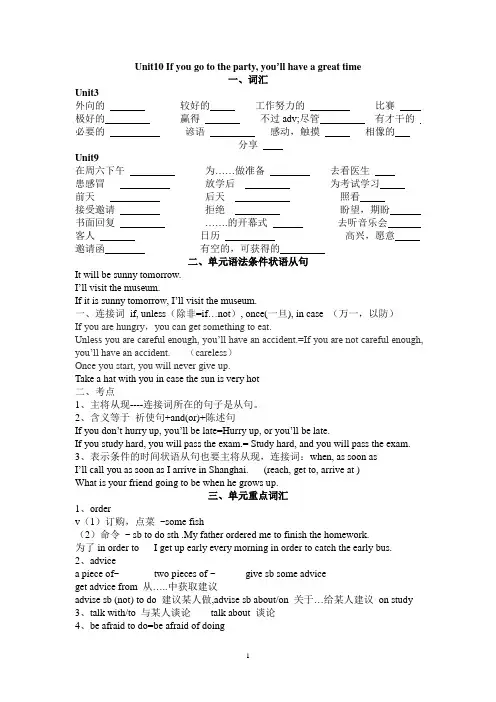
Unit10 If you go to the party, you’ll have a great time一、词汇Unit3外向的较好的工作努力的比赛极好的赢得不过adv;尽管有才干的必要的谚语感动,触摸相像的分享Unit9在周六下午为……做准备去看医生患感冒放学后为考试学习前天后天照看接受邀请拒绝盼望,期盼书面回复…….的开幕式去听音乐会客人日历高兴,愿意邀请函有空的,可获得的二、单元语法条件状语从句It will be sunny tomorrow.I’ll visit the museum.If it is sunny tomorrow, I’ll visit the museum.一、连接词if, unless(除非=if…not), once(一旦), in case (万一,以防)If you are hungry,you can get something to eat.Unless you are careful enough, you’ll have an accident.=If you are not careful enough, you’ll have an accident.(careless)Once you start, you will never give up.Take a hat with you in case the sun is very hot二、考点1、主将从现----连接词所在的句子是从句。
2、含义等于祈使句+and(or)+陈述句If you don’t hurry up, you’ll be late=Hurry up, or you’ll be late.If you study hard, you will pass the exam.= Study hard, and you will pass the exam. 3、表示条件的时间状语从句也要主将从现,连接词:when, as soon asI’ll call you as soon as I arrive in Shanghai. (reach, get to, arrive at )What is your friend going to be when he grows up.三、单元重点词汇1、orderv(1)订购,点菜~some fish(2)命令~ sb to do sth .My father ordered me to finish the homework.为了in order to I get up early every morning in order to catch the early bus.2、advicea piece of~ two pieces of ~ give sb some adviceget advice from 从…..中获取建议advise sb (not) to do 建议某人做,advise sb about/on 关于…给某人建议on study3、talk with/to 与某人谈论talk about 谈论4、be afraid to do=be afraid of doingI’m afraid to speak in class= I’m afraid of speaking in class条件状语从句练习1.(2010潍坊中考)You have to leave now________you can catch the early bus..A.so that B.as soon as C.because D.if2. (2010上海中考)We will have no water to drink _______we don’t protect the earth.A.untilB.beforeC.thoughD.if3.(2010·铜仁中考)— May I go to the concert with you?—I’m afraid not ____ you have a ticket, because I have only one.A. sinceB. ifC. unlessD. though4.(2011哈尔滨)As we all know, planting trees is good for the environment. Our class will go to the Sun Island tomorrow. As soon as we there, we’ll begin to plant tree s.A. arrivedB. arriveC. will arrive5.(2011广东)—Let’s go fishing if it _____ this weekend.—But nobody knows if it _______.A. is fine, will rainB. will be fine, rainsC. will be fine, will rainD. is fine; rains6.(2011黑龙江齐齐哈尔)I’m waiting for my friend. , I’ll go shopping a lone.A. If she comesB. If she doesn’t comeC. If she won’t come7.(2011重庆江津)If she here tomorrow, I will tell you.A. comesB. will comeC. comeD. came8.(2011山东滨州)—Mary, could you tell me if your mother ________ our school sports meeting tomorrow?—I th ink she will come to school if she _________ free.A. will take part in; will beB. takes part in; isC. will take part in; isD. takes part in; will be9.(2011山东泰安)—Tom wants to know if you will have a picnic tomorrow.—Yes. But if it ______, we’ll play chess instead.A. will rainB. rainedC. is rainingD. rains10.(2011山东潍坊)If Tom _____ the game, we'll give him a surprise".A. winB. winsC. wonD. miming11.(2011浙江宁波)— I hear the famous singer Xu Song may come to Ningbo next month.— Really? _______ he comes, my younger sister will be very excited.A. IfB. UntilC. UnlessD. Before12.(2011雅安)The students ________ have a sports meeting this weekend if it ________.A. won’t; rainsB. will; rainsC. won’t; will rainD. are going to; is going to rain13.(2011湖南湘西)Don’t talk loudly a t the meeting. If you ________, you will have to leave.A. doB. areC. did14.(2011湖南益阳)I don't know if she to my birthday party tomorrow. If she , I'll be very happy.A. comes; comesB. will come; comesC. comes; will come15.( 2011大庆) — When will you come to Daqing?— I will call you _____I arrive.A. tillB. whileC. as quickly asD. as soon as16.(2011广西崇左)I’ll give it to Jim as soon as I ____him tomorrow.Asaw B.will see C.see D.have seen17.(2011北京)I will send you an e-mail as soon as I____ in Canada.A. arriveB. arrivedC. am arrivingD. will arrive18.(2011陕西)If there no buying and selling of animals, there no killing in nature.A. is; will heB. will be; will beC. is; isD. will be; is19.(2011黑龙江绥化市)I’m waiting for my friend. _, I'll go shopping alone.A. If she comesB. If she won't comeC. If she doesn't come20.(2011内蒙古包头)You can’t watch TV ________ you finish your homework.A. beforeB. ifC. whileD. as21.(2012.安徽省)-- What's your plan for the summer holidays?--I’ll go to Beijing_____ the school term ends.A. in order thatB. so thatC. as soon asD. even though22.(2012福建福州)— We'll go for a picnic if it____________this Sunday.— Wish you a lovely weekend.A. rainB. doesn't rainC. won't rain23.(2012年广东省)— If our government _____attention to controling(控制) food safety now, our health _____in danger.A.won’t pay, isB. doesn’t pay, isC. won’t pay, will beD. doesn’t pay, will be24.(2012湖北黄冈)—Excuse me. Could you wake me up when my friend____ here?—Of course. [:hat we still don't know when your friend _____ here.A. comes; will comeB. comes;comesC. will come; comesD. will come;will come25.(2012四川成都)—I want to know when Mr. Brown will arrive.—When he , I will tell you.A. will arriveB. arrivedC. arrives26.(2012四川雅安市)If a polar bear_____, it _____fish from the water.A. will be hungry; catchesB. is hungry; will catchC. is going to be hungry; catchesD. is hungry; won’t catch27.(2012浙江衢州)We Will go for a picnic if it_______tomorrow.A. doesn't rainB. wasn't rainyC. won't rainD. wasn't raining28.(2012贵州六盘水)-Do you know if we will go for a picnic this Saturday?-I think we will if we any classes.A. won ' t haveB. didn’t' t haveC. don't haveD. aren ' t having29.(2012贵州铜仁)The bus driver always says to us ,―Don’t get off________ the bus stops.‖A. whenB. while C .until D. if30.(2012山东·东营市)– Excuse me, can I interview Mr. Miller this afternoon?-- A moment, please. Let me check .A. i f Mr. Miller will be freeB. when will Mr. Miller have timeC. if Mr. Miller had an appointmentD. when does Mr. Miller come back31.When I ____home yesterday evening, my father _____TV。
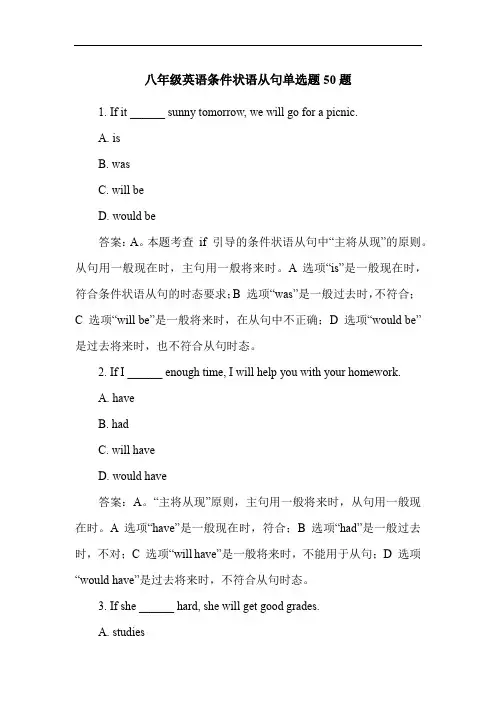
八年级英语条件状语从句单选题50题1. If it ______ sunny tomorrow, we will go for a picnic.A. isB. wasC. will beD. would be答案:A。
本题考查if 引导的条件状语从句中“主将从现”的原则。
从句用一般现在时,主句用一般将来时。
A 选项“is”是一般现在时,符合条件状语从句的时态要求;B 选项“was”是一般过去时,不符合;C 选项“will be”是一般将来时,在从句中不正确;D 选项“would be”是过去将来时,也不符合从句时态。
2. If I ______ enough time, I will help you with your homework.A. haveB. hadC. will haveD. would have答案:A。
“主将从现”原则,主句用一般将来时,从句用一般现在时。
A 选项“have”是一般现在时,符合;B 选项“had”是一般过去时,不对;C 选项“will have”是一般将来时,不能用于从句;D 选项“would have”是过去将来时,不符合从句时态。
3. If she ______ hard, she will get good grades.A. studiesB. studiedC. will studyD. would study答案:A。
依旧是“主将从现”,从句需用一般现在时。
A 选项“studies”是一般现在时第三人称单数形式,正确;B 选项“studied”是一般过去时;C 选项“will study”是一般将来时;D 选项“would study”是过去将来时,均不符合从句时态。
4. If you ______ to the party, you will have a great time.A. goB. wentC. will goD. would go答案:A。
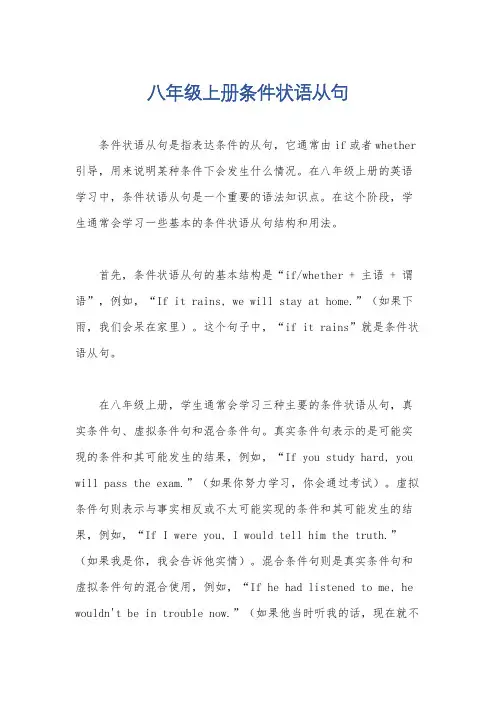
八年级上册条件状语从句条件状语从句是指表达条件的从句,它通常由if或者whether 引导,用来说明某种条件下会发生什么情况。
在八年级上册的英语学习中,条件状语从句是一个重要的语法知识点。
在这个阶段,学生通常会学习一些基本的条件状语从句结构和用法。
首先,条件状语从句的基本结构是“if/whether + 主语 + 谓语”,例如,“If it rains, we will stay at home.”(如果下雨,我们会呆在家里)。
这个句子中,“if it rains”就是条件状语从句。
在八年级上册,学生通常会学习三种主要的条件状语从句,真实条件句、虚拟条件句和混合条件句。
真实条件句表示的是可能实现的条件和其可能发生的结果,例如,“If you study hard, you will pass the exam.”(如果你努力学习,你会通过考试)。
虚拟条件句则表示与事实相反或不太可能实现的条件和其可能发生的结果,例如,“If I were you, I would tell him the truth.”(如果我是你,我会告诉他实情)。
混合条件句则是真实条件句和虚拟条件句的混合使用,例如,“If he had listened to me, he wouldn't be in trouble now.”(如果他当时听我的话,现在就不会陷入麻烦了)。
此外,学生还需要注意条件状语从句中的时态和语态的运用。
一般来说,条件状语从句中的时态和主句的时态有一定的关系,例如真实条件句中,如果主句是一般现在时,条件句中可以使用一般现在时或者一般将来时;虚拟条件句中,如果主句是过去时,条件句中通常使用过去时的虚拟语气。
另外,需要注意的是,条件状语从句中的倒装结构在虚拟条件句中的使用,例如,“Had I known the truth, I would have helped him.”(如果我当时知道真相,我就会帮助他)。
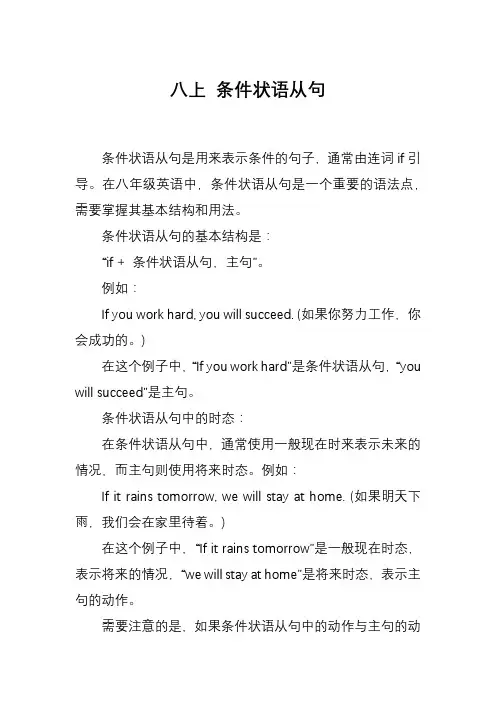
八上条件状语从句
条件状语从句是用来表示条件的句子,通常由连词if引导。
在八年级英语中,条件状语从句是一个重要的语法点,需要掌握其基本结构和用法。
条件状语从句的基本结构是:
“if + 条件状语从句,主句”。
例如:
If you work hard, you will succeed. (如果你努力工作,你会成功的。
)
在这个例子中,“If you work hard”是条件状语从句,“you will succeed”是主句。
条件状语从句中的时态:
在条件状语从句中,通常使用一般现在时来表示未来的情况,而主句则使用将来时态。
例如:
If it rains tomorrow, we will stay at home. (如果明天下雨,我们会在家里待着。
)
在这个例子中,“If it rains tomorrow”是一般现在时态,表示将来的情况,“we will stay at home”是将来时态,表示主句的动作。
需要注意的是,如果条件状语从句中的动作与主句的动
作同时发生,可以使用一般现在时或一般将来时。
例如:If you help me now, I will thank you later. (如果你现在帮助我,我以后会感谢你。
)
在这个例子中,“If you help me now”是一般现在时态,“I will thank you later”是一般将来时态,表示两个动作同时发生。
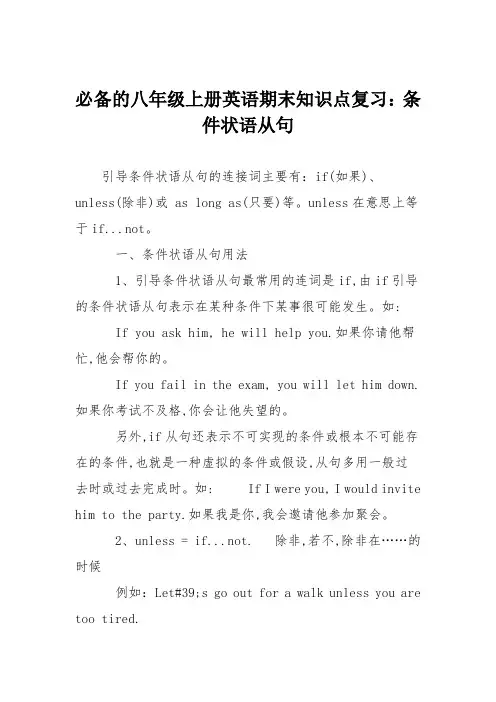
必备的八年级上册英语期末知识点复习:条件状语从句引导条件状语从句的连接词主要有:if(如果)、unless(除非)或 as long as(只要)等。
unless在意思上等于if...not。
一、条件状语从句用法1、引导条件状语从句最常用的连词是if,由if引导的条件状语从句表示在某种条件下某事很可能发生。
如: If you ask him, he will help you.如果你请他帮忙,他会帮你的。
If you fail in the exam, you will let him down.如果你考试不及格,你会让他失望的。
另外,if从句还表示不可实现的条件或根本不可能存在的条件,也就是一种虚拟的条件或假设,从句多用一般过去时或过去完成时。
如: If I were you, I would invite him to the party.如果我是你,我会邀请他参加聚会。
2、unless = if...not. 除非,若不,除非在……的时候例如:Let#39;s go out for a walk unless you are too tired.=If you are not too tired, let#39;s go out for a walk.Unless it rains, the game will be played.除非下雨,比赛将照常进行。
3、so/as long as只要例句;You may borrow my book as long as you keep it clean. 只要你保持书的清洁,你就可以把我的书借去。
So long as you’re happy, it doesn’t matter what you do. 只要你高兴,你做什么都没有关系。
二、时态问题在条件状语从句中,要注意“主将从现”的规定,即主句用一般将来时,从句用一般现在时表示将来时。
例句:I will come to see you if I have time. 我有时间,我就来看你。
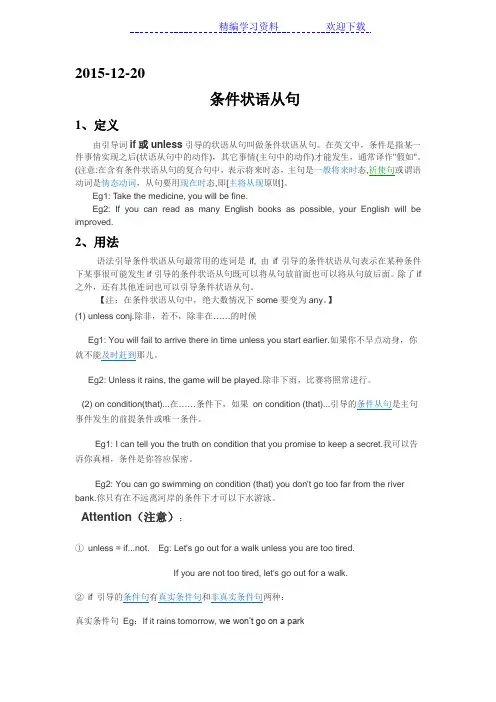
2015-12-20条件状语从句1、定义由引导词if或unless引导的状语从句叫做条件状语从句。
在英文中,条件是指某一件事情实现之后(状语从句中的动作),其它事情(主句中的动作)才能发生,通常译作"假如"。
(注意:在含有条件状语从句的复合句中,表示将来时态,主句是一般将来时态,祈使句或谓语动词是情态动词,从句要用现在时态,即[主将从现原则]。
Eg1: Take the medicine, you will be fine.Eg2: If you can read as many English books as possible, your English will be improved.2、用法语法引导条件状语从句最常用的连词是if, 由if引导的条件状语从句表示在某种条件下某事很可能发生if引导的条件状语从句既可以将从句放前面也可以将从句放后面。
除了if 之外,还有其他连词也可以引导条件状语从句。
【注:在条件状语从句中,绝大数情况下some要变为any。
】(1) unless conj.除非,若不,除非在……的时候Eg1: You will fail to arrive there in time unless you start earlier.如果你不早点动身,你就不能及时赶到那儿。
Eg2: Unless it rains, the game will be played.除非下雨,比赛将照常进行。
(2) on condition(that)...在……条件下,如果on condition (that)...引导的条件从句是主句事件发生的前提条件或唯一条件。
Eg1: I can tell you the truth on condition that you promise to keep a secret.我可以告诉你真相,条件是你答应保密。
Eg2: You can go swimming on condition (that) you don't go too far from the river bank.你只有在不远离河岸的条件下才可以下水游泳。
条件状语从句的三种形式一、if引导的条件状语从句1、如果你乐意,我们可以去公园散步。
If you are willing, we can go for a walk in the park.2、如果他住得太远,他就不能每天都来上班。
If he lived too far, he couldn’t come to work every day.3、如果有机会,我真想去法国旅行。
If I have a chance, I would really like to travel to France.4、如果你想获得更好的成绩,你应该对自己更严格一些。
If you want better grades, you should be stricter with yourself.二、unless引导的条件状语从句1、除非你受邀,否则别去参加他们的派对。
Unless you are invited, don't go to their party.2、除非你有权限,否则请勿进入这一地区。
Unless you have permission, do not enter this area.3、除非你将成绩提高,否则不会被录取。
Unless you improve your grades, you will not be accepted.4、除非天气转好,否则我们就不会去公园玩耍。
Unless the weather turns better, we won't go to the park to play.三、as long as引导的条件状语从句1、只要你努力,我们就可以赢得这场比赛。
As long as you try hard, we can win the game.2、只要你坚持,你就可以完成这项任务。
As long as you persist, you can finish the task.3、只要你学习努力,你就可以获得优等奖学金。
初中英语语法专题—条件状语从句讲解条件状语从句是英语语法中的一种从句,用于表达某种条件下才会发生的情况。
在初中英语研究中,掌握条件状语从句的用法对于正确理解和运用英语句子起着至关重要的作用。
本文将详细讲解条件状语从句的基本结构和常用形式。
基本结构条件状语从句的基本结构为:if/when/unless/so long as/provided that等引导词 + 主语 + 谓语。
其中引导词if是最常用的。
例如:- If it rains, we will stay at home.- When you are hungry, you should eat something.- I won't go unless you invite me.常用形式条件状语从句可以有多种形式,常见的有以下几种:1. 一般现在时如果主句是一般将来时,条件从句常用一般现在时表示将来的条件。
例如:2. 一般过去时如果主句是过去时,条件从句常用一般过去时表示过去的条件。
例如:- If it rained, we stayed at home.3. were to + V原用于表达与现在事实相反的情况,表示假设的内容。
例如:- If I were rich, I would buy a big house.4. should + V原表示建议或者要求。
例如:- If you should have any problems, feel free to ask for help.5. 省略 if在主句前可以省略if,但主句表达的语气必须是祈使句。
例如:- Study hard, and you will succeed.高级用法除了以上的基本结构和常用形式,条件状语从句还有一些高级用法需要注意。
1. 虚拟条件句表示与现在事实相反的假设情况,常用虚拟语气来表示。
例如:- If I won the lottery, I would travel around the world.2. 祈使句当主句为祈使句时,条件状语从句常用完全倒装的形式。
英语中考专项条件状语从句第一:条件状语是在句子中用来表达某种条件或前提的短语或从句。
它们通常用来描述一个事件或情况发生的条件。
条件状语可以使用各种不同的词或短语,以下是一些常见的条件状语及其定义:1. If(如果):表示假设条件,并指明某事可能发生的条件。
例句:If it rains, we will stay at home.(如果下雨,我们将待在家里。
)2. Unless(除非):表示除非某个特定条件成立,否则某事将发生。
例句:I won't go out unless it stops raining.(除非停止下雨,否则我不会出去。
)3. As long as(只要):表示只要某个条件得到满足,就会发生某事。
例句:You can stay here as long as you keep quiet.(只要保持安静,你可以在这里待着。
)注意:紧跟着引导词的是从句,另一部分是主句。
1)引导词if:(如果当然,我可以给您提供三个使用引导词"unless"的例子,并对每个例子进行详细说明:2)希望以上解释对您有所帮助!如果您还有其他问题,请随时提问。
)好的,以下是三个使用引导词"if"的例子,并对每个例子进行详细说明:1. If I work hard, I will succeed.这个句子中的主句是一般将来时态(will succeed),从句是一般现在时态(I work hard)。
条件状语"If I work hard"表示假设或前提,指出只有当我努力工作时,才会取得成功。
主句表达了一个结果,即未来的成功。
因此,这个句子传达了如果我努力工作,我将会成功的意思。
2. If it rains, we can't go for a picnic.这个句子中的主句是含有情态动词的一般现在时态(can't go),从句是一般现在时态(it rains)。
中考重点条件状语从句的引导词与句型条件状语从句是复合句中的一种从句类型,用来表示某种条件下,主句中的动作或状态发生的情况。
在中考中,条件状语从句是一个非常重要的语法知识点,考查的频率较高。
良好的掌握和运用条件状语从句的引导词与句型,对于中考英语的顺利通过至关重要。
本文将介绍中考中的重点条件状语从句的引导词与常见的句型,并给出相应的例句进行说明。
一、引导条件状语从句的词语1. if(如果)if是引导条件状语从句的最常见的词语之一,表示某种条件情况的发生。
例句:- If it rains tomorrow, I will stay at home.(如果明天下雨,我会呆在家里。
)- You will succeed if you work hard.(如果你努力工作,你会成功。
)2. unless(除非)unless是引导条件状语从句的另一个常见词语,表示某种条件情况下才会发生某种动作或状态。
例句:- You will fail the test unless you study hard.(除非你努力学习,否则你会考不及格。
)- Unless you apologize, I won't forgive you.(除非你道歉,否则我不会原谅你。
)3. as long as(只要)as long as也是引导条件状语从句的一个常见词语,表示只要满足某种条件,就会发生某种结果。
例句:- You can go out to play as long as you finish your homework.(只要你完成作业,你可以出去玩。
)- I will support you as long as you follow your dreams.(只要你追随梦想,我会支持你。
)4. provided/providing(只要;倘若)provided或providing也是引导条件状语从句的常见词语,表示只要满足某种条件,就会发生某种结果。
初中if引导的条件状语从句用法条件状语从句用于表示一个条件或前提,它通常由if引导。
条件状语从句通常指的是未来可能发生的事情,它与主句之间存在因果关系。
条件状语从句的基本结构是“if +条件句子,主句”。
其中条件句子可以是陈述句、祈使句或者问句。
例如:-如果你学习努力(条件句子),你会取得好成绩(主句)。
-倘若明天下雨(条件句子),我们就不去度假(主句)。
-要是他来了(条件句子),请告诉他我会晚点到(主句)。
以下是一些拓展用法:1.构造虚拟条件句子:虚拟条件句子用来表达与现实相反的假想情况。
主句的情态动词常常是“would”,而条件句中的动词需使用过去时态。
例如:-如果我有足够的钱(条件句子,现在假设),我就会买一辆新车(主句)。
-如果我能回到过去(条件句子,现在不可能),我会改变很多事情(主句)。
2.使用倒装结构:如果条件句以“had”或是“were”开头时,可以使用倒装结构。
例如:- Had I known you were sick(条件句子),I would have visited you(主句).- Were I taller(条件句子),I could reach the top shelf (主句).3.使用“unless”表示否定条件:除了使用“if”之外,我们也可以使用“unless”来引导否定条件状语从句。
例如:- Unless you study hard(条件句子),you won't pass the test(主句).- We won't have a picnic(主句)unless it stops raining (条件句子).总之,条件状语从句用于表示可能发生的条件情况,其语法结构为“if +条件句子,主句”。
拓展用法包括虚拟条件句子、倒装结构和使用“unless”来表示否定条件。
初二年级英语条件状语从句与让步状语从句逻辑关系理解单选题50题1. If you study hard, ____ you will get good grades.A. andB. butC. orD. so答案:A。
解析:在条件状语从句中,“if”引导条件,“and”在这里表示一种顺承关系,即如果努力学习,就会取得好成绩。
B选项“but”表示转折,不符合逻辑;C选项“or”表示选择或者否则的意思,在这里不适用;D选项“so”表示因果关系,这里是条件关系而非因果关系。
2. We'll go to the park tomorrow ____ it doesn't rain.A. as long asB. becauseC. thoughD. since答案:A。
解析:“as long as”表示只要,引导条件状语从句。
句子意思是只要明天不下雨,我们就去公园。
B选项“because”表示原因,这里不是因果关系;C选项“though”表示让步关系,不符合题意;D选项“since”表示原因或者自从,不适合这里的逻辑关系。
3. You can't go out to play ____ you finish your homework.A. whenB. ifC. untilD. while答案:C。
解析:“until”表示直到,在这里的逻辑是直到完成作业才能出去玩,是一种条件关系。
A选项“when”表示当……时候,强调时间点;B选项“if”如果,与这里的逻辑不符;D选项“while”当……时候,通常表示两个动作同时进行,不符合本题逻辑。
4. ____ you practice more, you will be better at singing.A. IfB. UnlessC. AlthoughD. Since答案:A。
解析:“if”引导条件状语从句,如果多练习,就会更擅长唱歌。
条件状语从句1、定义由引导词if 或unless 引导的状语从句叫做条件状语从句。
在英文中,条件是指某一件事情实现之后(状语从句中的动作,其它事情(主句中的动作才能发生,通常译作" 假如" 。
(注意:在含有条件状语从句的复合句中,表示将来时态,主句是一般将来时态, 祈使句或谓语动词是情态动词,从句要用现在时态, 即[主将从现原则]。
Eg1: Take the medicine, you will be fine.Eg2: If you can read as many English books as possible, your English will be improved.2、用法语法引导条件状语从句最常用的连词是if, 由if 引导的条件状语从句表示在某种条件下某事很可能发生if 引导的条件状语从句既可以将从句放前面也可以将从句放后面。
除了if 之外,还有其他连词也可以引导条件状语从句。
【注:在条件状语从句中,绝大数情况下some 要变为any 。
】(1 unless conj.除非,若不,除非在……的时候Eg1: You will fail to arrive there in time unless you start earlier.如果你不早点动身,你就不能及时赶到那儿。
Eg2: Unless it rains, the game will be played.除非下雨,比赛将照常进行。
(2 on condition(that...在……条件下,如果 on condition (that...引导的是主句事件发生的前提条件或唯一条件。
Eg1: I can tell you the truth on condition that you promise to keep a secret.我可以告诉你真相,条件是你答应保密。
Eg2: You can go swimming on condition (that you don't go too far from the river bank. 你只有在不远离河岸的条件下才可以下水游泳。
Attention (注意):① unless = if...not. Eg: Let's go out for a walk unless you are too tired.If you are not too tired, let's go out for a walk.② if 引导的条件句有真实条件句和非真实条件句两种:真实条件句 Eg :If it rains tomorrow, we won’t go on a park非真实条件句是虚拟语气的一种,表示与事实相反,主句用would do,从句用过去式,具有假设性,一定不会是真的, 即所假设的事情基本不会有发生的可能。
Eg :If I were you, I would go with him.③so/as long as (只要)、in case(万一)引导。
Eg1: So long as you’re happy, it doesn’t matter what you do. 只要你高兴,你做什么都没有关系。
You may borrow my book as long as you keep it clean只要你保持书的清洁,你就可以把我的书借去。
Eg2: Take your umbrella in case it rains. 带着你的伞吧,以防下雨。
④“祈使句+and / or+简单句”。
其中and 表示句意顺承;or 则表示转折,意为“否则”。
Eg1: If you work harder, you’ll pass the exam.= Work harder, and you’ll pass the exam. 如果你再努力些,你就会通过考试。
Eg2: If you don’t hurry up, you’ll miss the train.= Hurry up, or you’ll miss the train. 如果你不快点儿,你就赶不上火车了。
3、练习题Ⅰ. 单项选择1 .If you _____ to the party, you’ll have a great time.A. will goB. wentC. goD. going2. It will be a long time ____ Peter _____ his work.A. since, has finishedB. after, finishesC. when, will finishD. before, finishes.3. What will father _____ us from Japan?A. takeB. bringC. carryD. make4.I ____ her the answer if she ____me.A. can tell, will askB. will tell, will askC. would tell, askD. will tell, asks5. – What are you going to do tomorrow? --We’ll go to the library tomorrow if it____.A. isn’t rainB. rainC. won’t rainD. doesn’t rain6. —Do you know when he will come back tomorrow? --Sorry, I don’t know. When he ____ back, I’ll tell you.A. comesB. will comeC. comeD. may come7. What will you do if you _____ to the old folk’s home visit?A. goB. wentC. goingD. will go8. If I eat ____ food, I’ll be very fat.A. too manyB. many tooC. too muchD. much too9. I’ll give the book to him if he ___ here next Sunday.A. will comeB. comesC. is comingD. came10. There ____an English film in our school tomorrow. A. is going to have B. will have C. is going to be D. has11. Could you tell us where ____?A. will the next Olympic Games heldB. the next Olympic Games will be heldC. would the next Olympic Games be heldD. the next Olympic Games would be held12. When my mother returned last night, I ____ a book. A. read B. am reading C. was reading D. am going to read13. What ____ you ____ when it began to rain?A. do, doB. were, doingC. are, doingD. did, do14. I’ll wake you up when he ____back.A. willB. is going to comeC. comesD. come II. 同义句转换1. Run fast, or you’ll be late for school._______ you _______ _______ fast, you’ll be late for school.2. You can buy the dictionary if you take enough money with you.Take enough money with you, ______ _____ ______ buy the dictionary.3. If there is no air, none of us can live.None of us can live _______ _________.Ⅲ、用所给词的适当形式填空1.If you ______(feel tired, you _____ (have to have a rest.2. Where _____ he ____(see the film if he _______(have time?3. If there ____(be fewer trees, there ____( be more pollution.4. He ___ (dress more casually if he ___( not work on weekends.5. If Marcia ______ (live alone, she _______( keep a pet parrot.6. Lana ___(buy )7. The twins ______(fight(打架) if they_____(argue.8. Peter ____( send me a beautiful souvenir (纪念品)if he ____(tour Spain.9. If Mr Green _______ (say I am hard- working, my parents ___( feel glad.10.I ______(go to the beach if it______( not rain this week.11. _____they ___( have a match if the P.E. teacher __(be busy?12.He ____(write a letter to his grandparents if he ____(get his report card this week.13. If she ____(get up late, she ____( not catch the early bus.Ⅳ. 完成句子1. 如果他到得晚了会发生什么事情?What ______ ______ if he ______ late?2. 如果努力学习,你就会取得好成绩。